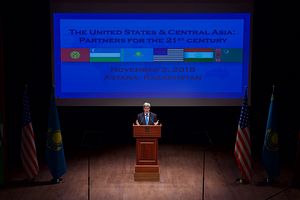Tuesday at Nazarbayev University in Astana, U.S. Secretary of State John Kerry articulated the United States’ vision for its relationship with Central Asia. While he specifically said that “America’s stake in Central Asia … extends far beyond security,” his depiction of the relationship circled around security nonetheless. He identified three challenges which the U.S. and Central Asia must face together: economics, environment and energy, and combatting international terrorism.
After making a few not-quite-accurate comments (I get to that below the fold) and complementing the host university, Kerry tried to connected the dots between the U.S. and Central Asia, from stability to prosperity via good governance.
“Now, of course, we have learned over time that both stability and prosperity are closely linked to good governance – governance that is powered by participatory, accountable institutions and guided by the rule of law,” Kerry said. He commented that the U.S. has learned (“sometimes the hard way”) that elections are just one aspect of a democracy.
“Elections matter little if they are not free and fair, with all political parties competing on a level playing field. And promises contained in constitutions and laws – they don’t amount to much unless those promises are actually kept,” he said.
Though Kerry was careful with his words, such comments were certainly aimed at Kazakhstan itself. Earlier this year, Nazarbayev won another term in office with a astounding 97 percent of the vote. The Kazakh constitution limits a president to two terms–except for the First President. The OSCE election monitoring mission concluded that the election, although it was orderly and peaceful, did not present voters with a genuine choice.
In his intro Kerry thanked Kazakh Prime Minister Karim Massimov for attending, saying “I appreciate very much that an elected politician is willing to sit through the speech of a non-elected politician,” to laughter in the auditorium. Massimov, who has twice served as prime minister, wasn’t exactly elected–he was appointed by the President and approved by the parliament. Between his two premierships, 2012 to 2014, Massimov served as Nazarbayev’s chief of staff. Like Kerry, Massimov serves at the pleasure of his president–not the electorate.
Kerry identified three challenges which the U.S. and Central Asia “are well positioned to take on”: economics, environment and energy, and combatting international terrorism. Within each, Kerry wove in notes on security. Commenting that many of the world’s youth are ambitious, but lack opportunity, Kerry warned of a “a race between opportunity and frustration, and believe me, my friends, that is a race that we cannot afford to lose.” Then, in reference to global warming, Kerry noted that as global temperatures rise demand for increasingly scarce water resources will as well and “we know that tensions over scarce resources could easily escalate.”
In both areas–economics and environment–Kerry made sound arguments. Economic integration doesn’t have to be viewed as zero-sum game, a direct nod to both Chinese and Russian investments in the region, but also those of India, Japan, South Korea and others. He also pointed out that while Kazakhstan has made itself rich on oil and gas, economic pressures, and climate change should spurn a shift toward a more sustainable economy. This feasibility of those will hinge on Astana attracting international investors and businesses, and that in turn hinges in part on repairing the country’s images as a corrupt and difficult business environment.
Economics, the environment, and energy remain serious American interests in Central Asia. But conversations always tend to revert to security.
In Astana, Kerry was much more clear on the link between human rights and security, making the argument that “we have to understand that the terrorist presence doesn’t give authorities a license to use violence indiscriminately.” Certainly a much more lucid statement than vague references in Uzbekistan to the “human dimension.” But while Kerry’s comment that “… terrorism is not a legitimate excuse to lock up political opponents, diminish the rights of civil society, or pin a false label on activists who are engaged in peaceful dissent,” certainly hits the nail on the head, it’s a message likely to fall on deaf ears.

































